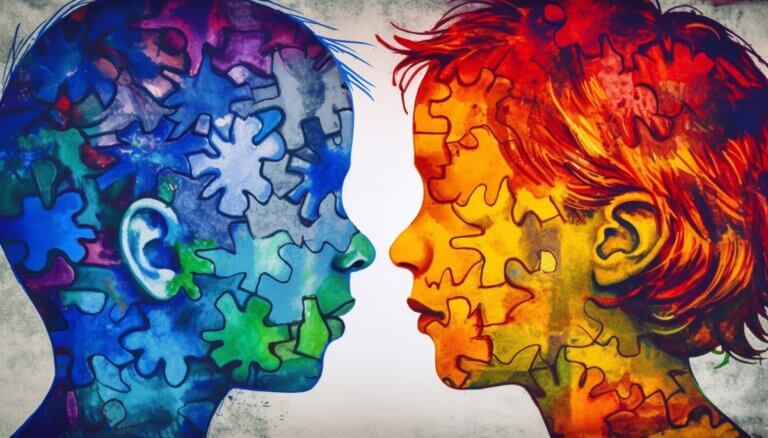Table of Contents
Self-perception and Self-regulation – The Cornerstones of Emotional Intelligence

Awareness of One’s Own Emotions
In a world shaped by decisions of every magnitude, emotional intelligence plays a central role, especially in the context of decision-making and judgment. The ability to recognize a budding feeling within oneself and understand its origin is an essential element of emotional intelligence during decision-making processes.
Emotional Self-Awareness in a Professional Setting
Imagine a project manager facing a tricky decision: Should additional resources be invested into a risky, yet potentially rewarding project? Emotional intelligence in decision-making allows him to register his initial enthusiasm without letting it cloud his rationality. Through conscious reflection, he can recognize his own uncertainty, leading him to act more prudently and possibly seek additional information before making an informed decision.
- Another example: A team leader notices sudden irritation during a meeting. By accepting and reflecting on her emotions, she identifies the cause – an unspoken conflict with a colleague. This self-awareness helps her avoid escalation and address the issue in a diplomatic manner.
- Emotional decision-making also plays a significant role beyond the office walls. Consider the stress that follows us home. An individual awareness of one’s irritability allows taking a break before speaking with family members and inadvertently taking out frustration on them.
- Handling criticism is also a defining example of the importance of emotional intelligence. Recognizing and categorizing one’s initial emotional reaction to criticism – often defense or disappointment – enables a constructive engagement with the feedback.
Scientific Insights into Self-Awareness
Studies in the field of psychological research emphasize the benefits of heightened emotional self-awareness, ranging from improved interpersonal relationships to increased work performance. Research shows that people with a high level of emotional intelligence and judgment are more capable of controlling impulses, leading to more thoughtful and less impulsive behavior.
Emotional Intelligence influences everyone’s life. Those who learn to understand their emotions and respond appropriately are often those who are more successful at work and more satisfied in their personal lives. For decision-making, this means that a conscious approach to one’s own feelings contributes to smarter and more balanced decisions. Whether in difficult negotiations, resolving conflicts, or dealing with failures – emotional intelligence is a key skill for a fulfilled and successful life.
Strategies for Self-Control
The ability to effectively manage emotions in decision-making is the core of Emotional Intelligence. Integrating Emotional Intelligence into decisions means developing a strong awareness of one’s own feelings as well as perceiving and appropriately responding to the emotions of others. Especially when it comes to the Emotional Intelligence decision-making process, targeted self-control is essential. Instead of hasty, possibly emotionally charged responses, Emotional Intelligence in judgment allows for a considered, thoughtful reaction.
The Principle of Self-Awareness
A strategy and at the same time the first step in self-control is the improvement of self-awareness. It involves recognizing inner emotions and understanding their influence on one’s own behavior. For example, an executive who notices his emerging frustration during negotiations can consciously decide to take a break, rather than make poor decisions in a heated mood.
- Mindfulness exercises can sharpen awareness of one’s own emotional state and help avoid impulsive actions.
- Keeping a diary about experienced emotions and resulting decisions promotes self-reflection.
- Seeking feedback from colleagues or friends about one’s behavior in certain situations can provide additional insights.
Techniques of Self-Regulation
The next step is self-regulation, which requires consciously managing emotions. For instance, when a teacher feels that she is losing patience in a hectic class, she can take a deep breath and count to create a moment of calm and then respond constructively, rather than with a loud voice.
- Cognitive restructuring, which means being aware that thoughts influence emotions and deliberately reshaping negative thoughts into positive ones.
- Relaxation techniques such as deep breathing or meditation, to reduce stress and promote clear thinking.
- Applying the timeout principle to achieve emotional detachment from the situation and a refocusing on rational considerations.
Deciding with Emotional Wisdom
Emotional decision-making can be incorporated into our daily lives by developing long-term strategies in addition to short-term regulation. Those who act with emotional intelligence also build resilience, which helps make wise decisions even under stress.
- Using long-term goals and values as a compass to set emotional reactions in the context of the bigger picture.
- Recognizing personal triggers and planning countermeasures to not be overwhelmed by strong emotions.
- Learning to deal constructively with failures and setbacks by understanding them as opportunities for growth.
Integrating Emotional Intelligence into decision-making allows for deeper and more conscious interaction with our environment. It connects head and heart in a way that not only makes us more human but also more successful in personal and professional life. By learning to view emotions as valuable data that help understand what is truly important, Emotional Intelligence and judgment become an invaluable tool for a fulfilled life.
Social Awareness and Relationship Management – The Social Aspect of Emotional Intelligence

Empathy as the Key to Interpersonal Connection
Emotional intelligence is the engine that drives our social relationships, and it plays a crucial role in how we make decisions. Empathy, a profound understanding of the emotions of others, is a focal point of emotional intelligence in decision-making.
Empathy in Teamwork
Imagine a group discussion where members need to reach a consensus on a particular topic. Without empathy, the discussions could end in endless debates. However, when participants act empathically, they recognize the emotional frameworks of their colleagues. They understand that behind every statement and every position there are human feelings. This insight is invaluable for any emotional intelligence decision-making process and often leads to more balanced and inclusive solutions.
- A leader uses empathic skills to address concerns in a team, thereby fostering a climate of trust and openness.
- When introducing a new company policy, empathy is used to understand the impact on the staff and to proactively address resistance.
- In negotiations, emotional intelligence helps to better assess the counterpart and acknowledge what leads to fair and sustainable agreements.
Empathic Decisions
Empathy influences not only collective decision-making but also emotional decision-making on an individual level. It allows us to reflect on our emotional responses and foresee the potential consequences of our decisions for other people. This highlights a central facet of emotional intelligence and judgment formation: The ability to expand one’s own perspective and make emotionally intelligent decisions that transcend one’s own horizon.
- A manager must choose between two candidates for a promotion and considers not just the facts but also the emotions and motivations behind the applications.
- A doctor decides on a treatment plan and takes into account the emotional needs of the patient.
- A consumer facing a choice of a product contemplates not only the product features but also the social and ecological impact of their decision.
The integration of empathy into decision-making enriches the process with a human component and promotes outcomes that reflect the emotional landscape of all involved. Through the understanding of others and the integration of this understanding into our actions, we become not only more effective decision-makers but also more compassionate and connected members of society.
Effective Communication and Conflict Resolution
Emotional intelligence in decision-making is a key aspect of effective communication and conflict resolution. It enables us to understand and adjust our own emotional responses as well as empathetically respond to the emotions of others. This empowers us to make informed decisions and constructively handle conflicts.
The Importance of Emotions in Communication
Emotional decision-making plays a crucial role in the way we communicate. Emotions are signals that express our needs and values. When we can accurately interpret these signals in ourselves and others, our ability to communicate effectively greatly improves. Imagine an employee who can recognize the frustration of their team about a new project. By applying emotional intelligence, this employee can initiate a constructive dialogue that empowers the team to express their true concerns and work together on a solution.
Emotional Intelligence in Conflict Resolution
Conflicts are inevitable in professional life. However, the capacity for emotional intelligence and judgment can significantly improve how conflicts are resolved. This means that emotions are not seen as obstacles, but rather as opportunities to improve collaboration. A simple example is a manager who may recognize that an employee’s anger at a project is actually fear of change. With this knowledge, the manager can provide targeted support and guide the employee through the change process.
- Observe and reflect: Be aware of not only your own emotions but also those of your conversation partners.
- Empathic communication: Ask questions and show interest in the feelings and perspectives of others.
- Self-regulation: Keep your own emotions in check to remain rational and clear.
The emotional intelligence decision-making process includes the ability to recognize, understand, and use emotions to make considered decisions and efficiently handle conflicts. It is a valuable tool in interpersonal communication and contributes significantly to professional success. With the practice of these skills, a significant advantage can develop in any professional role, opening the door to successful, cooperative, and long-term working relationships.
Summary
In today’s era, successful decision-making and effective judgment are closely linked with emotional intelligence. Emotional intelligence and decision-making enhance our understanding of personal emotional responses as well as the emotions of others, which is essential for professional success and personal satisfaction.
The Role of Emotional Self-Awareness
The ability to recognize and understand one’s own emotions in decision-making situations is an indispensable aspect of emotional intelligence in decisions. It allows, for example, a project manager to critically assess his excitement for a new project and gather information before making a well-considered decision.
- In a conflict, a leader can prevent escalation and act solution-oriented by recognizing their own emotions.
- Awareness of one’s emotions after work can prevent family tensions by consciously taking breaks.
Academic research confirms that a high level of emotional intelligence leads to better interpersonal communication and increased work performance. Emotion management is thus a central skill in the emotional intelligence decision-making process.
Developing Emotional Intelligence
Improving emotional intelligence and judgment begins with training self-awareness. Mindfulness, an emotional journal, or actively seeking feedback can help.
- Mindfulness exercises train awareness of one’s emotions and counteract impulsive actions.
- Cognitive restructuring can help break negative thought patterns and strengthen positive ones.
- Long-term goals and values serve as a compass to maintain an overview in challenging situations and positively influence emotional decision-making.
Empathy, as a core component of emotional intelligence, facilitates teamwork and leads to fairer, more inclusive decisions. This is significant both for emotional decision-making on an individual level and for collective decision processes.
Emotional intelligence in decisions also affects communication and conflict resolution, enabling more effective and clarifying actions. In this context, emotions are recognized as an important source of information rather than as obstacles.
By cultivating emotional intelligence and judgment, one not only enriches professional relationships but also fosters a more fulfilling social coexistence. Emotional intelligence in decisions characterizes a personality that acts competently, remains resilient, and navigates successfully with compassion – a key to a satisfied and successful life.
FAQ – Emotional Intelligence and Decision Making
How does emotional intelligence affect the quality of decisions in a professional context?
Emotional intelligence enables a person to identify, understand, and manage their own and others’ emotions, leading to well-founded and empathetic decisions in the workplace. Those who are emotionally intelligent are better able to cope with stress and resolve conflicts, which improves decision-making quality and contributes to a more harmonious work environment. Thus, emotional intelligence leads to more efficient teamwork and enhances leadership skills by helping to increase the motivation and engagement of others.
How can emotional intelligence lead to better results in decision-making?
Emotional intelligence enables one to better understand and manage one’s own feelings and those of others, leading to more considered and empathetic actions. In decision-making, this helps avoid impulsive reactions and instead make more rational, thoughtful decisions that take into account the needs and emotions of all involved. This can help avoid conflicts and improve teamwork, ultimately leading to better outcomes both professionally and personally.
How can emotional intelligence improve the quality of decisions in a team?
Emotional intelligence plays a crucial role in team building, as it leads to more effective communication and better understanding among members. It enables the team to resolve conflicts constructively and show empathy, leading to more informed and balanced decisions. A team with high emotional intelligence can thus enhance social dynamics as well as achieve common goals with a clear and focused vision.




